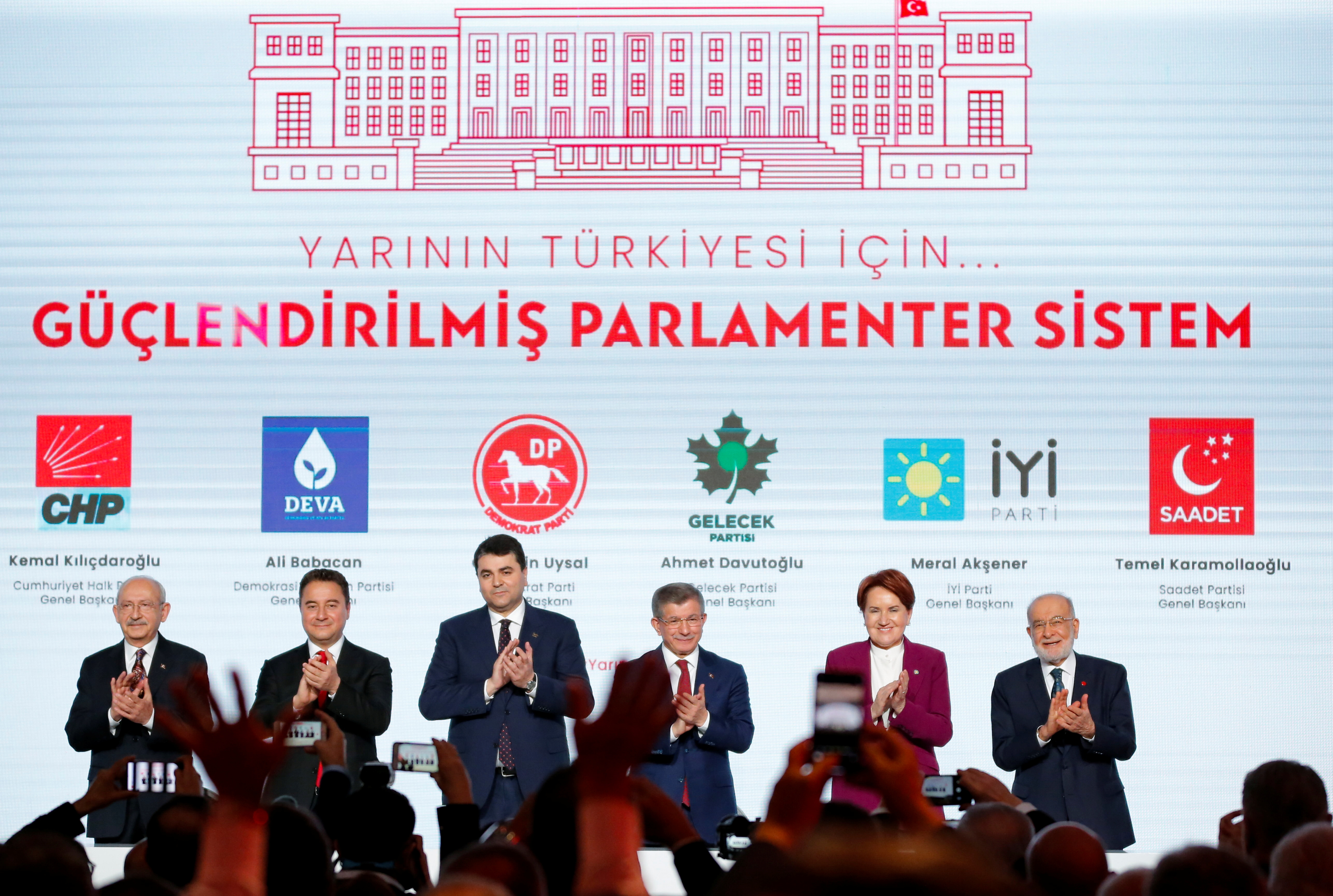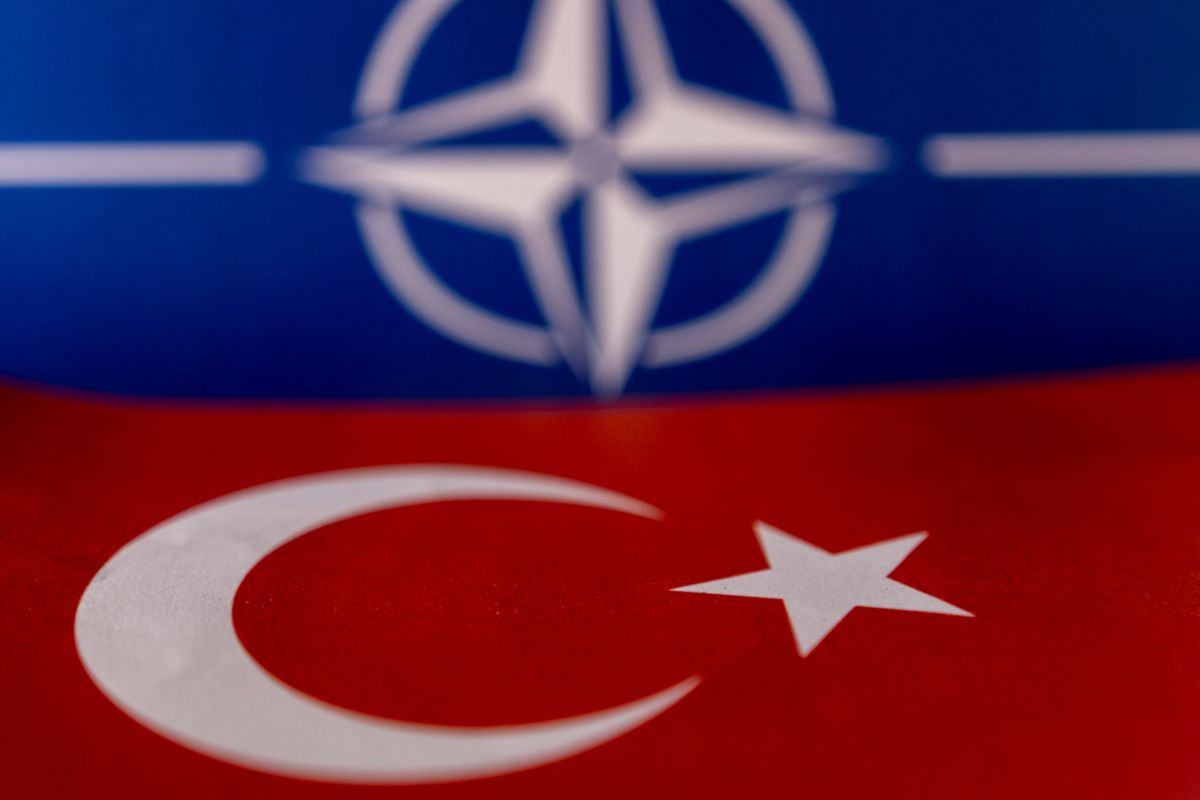Turkish Opposition Focuses on Foreign Policy Corrections
According to polls, the Turkish opposition candidate has a chance to defeat Recep Tayyip Erdoğan in next year’s presidential elections. Although the opposition parties’ vision of foreign policy is not consistent, as evidenced by public divergences in, for example, the approach to the EU or the war in Ukraine, they remain consistent with the need to improve Türkiye’s relations with the West.
 CAGLA GURDOGAN/Reuters/Forum
CAGLA GURDOGAN/Reuters/Forum
On 3 July, the fifth meeting of representatives of six Turkish opposition parties that oppose the presidential system introduced in Türkiye in 2018 took place. Four of them, the Republican People’s Party (CHP), Good Party (IP), Felicity Party (SP), and Democratic Party (DP), formed a coalition, the Nation Alliance, in 2018 and have 174 out of 600 seats in the parliament. The polls carried out in June this year indicate a slight advantage of the Alliance over the currently ruling coalition of the Justice and Development Party (AKP) and the Nationalist Action Party (MHP). If the opposition’s presidential candidate was the CHP’s most popular Mansur Yavaş, he would have a chance to defeat Erdoğan in the second round by 54% to 35.6%, according to the polls.
New and Old Visions of Foreign Policy
Due to the dominant role of the CHP and IP in the alliance, their foreign policy visions will influence the formation in a possible future post-Erdoğan government. In the opinion of the opposition, foreign policy in recent years has been too dependent on the personal preferences of the Turkish president. Therefore, the main goal of the Turkish opposition is to return to the parliamentary-cabinet system, a position on which the leaders of these parties signed a joint memorandum on 28 February. The opposition leaders recognise argue that a strengthened parliamentary system will restore balance and control mechanisms, which will contribute to creating transparency and accountability in the decision-making process with regard to foreign policy.
According to the political programme of the CHP and IP, the leading parties of the alliance do not want to give up their foreign policy aimed at maintaining a high degree of independence by the state from alliances and external pressures. Both the CHP, currently chaired by Kemal Kılıçdaroğlu, and the IP, led by Meral Akşener, oppose the interventionist policies of the great powers, especially the U.S. in the Middle East. They also question certain aspects of Turkish involvement in the region. Last year for the first time, the CHP did not support the request to extend the presence of Turkish military missions in Syria and Iraq. The leaders of the Alliance of the Nation also criticise the support provided so far to Syrian rebels. They are convinced that security and peace can be achieved by developing regional cooperation with the countries of the Middle East. Therefore, they declare that when they take power in the country, they will strive to re-establish diplomatic relations with Syria led by Bashar al-Assad, which would initiate the process of sending Syrians back from Türkiye to their country of origin. In addition, in this context, CHP, for example, is more in favour of the Palestinian side, while declaring the will to find a lasting solution to the Israeli-Palestinian problem in a two-state solution.
If they assume power, the larger coalition partners will have to consider the necessity of working out concessions regarding a common vision of foreign policy. There are politicians with various ideological backgrounds in the opposition, for example Akşener comes from the nationalist movement but Ahmet Davutoğlu from the Future Party (GP, which participated in the meeting on 3 July) was between 2009 and 2016 successively the foreign minister and prime minister in the AKP government.
Türkiye in NATO
The main opposition parties have expressed their will to continue Türkiye’s membership of NATO. A survey conducted in March showed that 58.9% of those polled who support the CHP and 57.8% backing IP believe that Türkiye should remain in the Alliance. These are higher figures than among AKP supporters. At the same time, nearly half of the supporters of the leading opposition groups indicate that Turkish foreign policy should be oriented more towards the EU and the U.S. than towards Russia and China. IP’s Akşener demands changes targeting Russia’s interests that would help to strengthen Türkiye’s anchoring in NATO. For example, she believes that it is in Türkiye’s interest to remove the Russian S-400 air defence system and to nationalise the Akkuyu nuclear power plant, the majority shares of which Rosatom holds.
However, with regard to the memorandum signed on 28 June between Türkiye, Sweden, and Finland, the opposition criticises the authorities from a more tenacious position in relation to NATO candidate countries. According to Akşener, the agreement in which states declared they are “not to support” the activities of groups such as the Kurdistan Workers’ Party (PKK), the Democratic Union Party (PYD), the People’s Self-Defence Units (YPG), and the Gülen movement—referred in the discourse of Turkish decision-makers as the Fethullah Gülen Terrorist Organisation (FETÖ)—was a concession that far from met the Turkish expectations. In her opinion, the authorities should rather demand “the shutdown of the PKK with all its elements from European lands”. In a less radical way, Kılıçdaroğlu also criticised the 28 June agreement, as he noted that the Turkish president had agreed to sign the document without getting anything in return other than “cheap propaganda”.
Turkish Opposition on the Russian Invasion of Ukraine
Opposition leaders have stated that the Russian aggression against Ukraine is a violation of international law and a threat to stability and peace in the region. They also point to Türkiye’s excessive dependence on Russia, especially in the context of energy security, which has been highlighted by the war. According to Akşener from IP, there is a problem of Russian expansionism in the world, and Russia’s attack on Ukraine requires decisive action and sanctions. The leaders of the CHP and the IP criticised the actions of the ruling coalition, which condemned the Russian attack on Ukraine but abstained from voting on the removal of Russia from the Council of Europe. In the opposition’s opinion, this inconsistency undermines the credibility of Turkish foreign policy. According to Akşener, Türkiye should more resolutely defend the interests of the Crimean Tatars, and in the CHP programme it advocates supporting the independence of the republics that gained it after the collapse of the USSR. However, at the same time Kılıçdaroğlu believes that Türkiye should remain impartial in the conflict between Russia and Ukraine and “do everything possible to end the war”.
Relations with the EU and Member States
Opposition parties emphasise the importance of relations with the EU but have a different vision of their future. The CHP recognises Türkiye’s membership of the EU as a natural continuation of the modernisation tradition initiated by Atatürk, the founder of the Republic of Türkiye and the party’s founder. The CHP rejects Türkiye’s different status in the EU than full membership. Other parties criticise the continuation of the protracted accession process. IP points out that the reason for the accession slowdown is the EU’s internal problems, and therefore proposes the development of a new formula for relations with the EU instead of unproductive efforts to join.
On the Cyprus issue, both the CHP and the IP favour an approach based on equality between the two de facto existing Cypriot states. They recognise that the Turkish Republic of Northern Cyprus should be recognised internationally. With regard to Turkish-Greek relations, the IP, like the CHP, indicates that Greece should fulfil its international obligations resulting from, among others, the provisions of the Treaty of Lausanne signed on 1923 and the Paris Peace Treaty signed on 1947.
Conclusions and Perspectives
In the long term, the assumption of power by the opposition, thanks to the increased support in NATO, may contribute to the improvement of relations with the U.S., which are currently in crisis. In turn, the opposition’s consent to the restoration of the parliamentary-cabinet system will have a positive effect on the prospects for reviving talks on Türkiye’s accession to the EU. Nevertheless, the advocacy of both the CHP and the IP for a two-state solution for Cyprus may be an obstacle to the improvement of Turkish-EU relations, as the EU calls for the reunification of Cyprus.
If the opposition takes power, they will demand from Poland greater involvement in supporting Türkiye’s membership in the community and in normalising Türkiye’s relations with the EU, for example, in order to accelerate the modernisation of the customs union and leading to visa liberalisation. On the other hand, an opposition victory may be an opportunity for the intensification of the development of Polish-Turkish cooperation, including in the defence sector. Opposition leaders have declared that the Turkish defence industry will continue to be developed and the deterrence capabilities of the Turkish Armed Forces will be increased.



